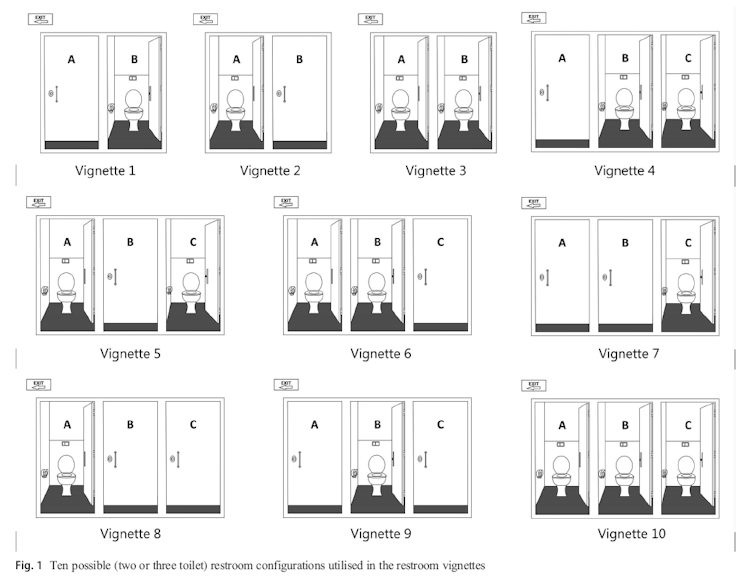For most people, the daily or near-daily ritual of going to the toilet is not something we think about much. But for some people, the need to do a “number two” in a public restroom or at work can be subject to significant stress and anxiety.
In recognition of the discomfort people can feel when defecating at work, the Queensland Department of Health recently launched a social media campaign with the message ‘It’s OK to poop at work’.
The campaign has taken off on Instagram and Facebook. It has been praised by health and marketing experts for its humorous handling of a taboo subject.
A colorful Instagram post is accompanied by text warning of the health risks of “keeping it in,” including hemorrhoids and other gastrointestinal problems. The title also points out:
If you find it very difficult to poop around other people, you may have pneumonia.
What is parcopresis?
Parcopresis, sometimes called a “shy bowel,” occurs when people experience difficulty or inability to poop in public restrooms due to fear of being observed by others.
People with pneumonia may find it difficult to go to the bathroom in public places such as shopping malls, restaurants, at work or school, or even at home when friends or family are around.
They may fear being judged by others because of the unpleasant smell or sound when they have a bowel movement, or how long it takes to pass, for example.
Living with a gastrointestinal disorder (at least four in ten Australians do) can contribute to parcopresis due to anxiety about needing to use the toilet frequently and feeling judged by others when they do. Other factors, such as past negative experiences or accessibility challenges, may also play a role.

Motion Films/Shutterstock
In sufferers, anxiety can manifest as a faster heart rate, faster breathing, sweating, muscle tension, flushing, nausea, tremors, or a combination of these symptoms. They may experience persistent anxiety about situations where they may have to use a public restroom.
Living with parcopresis can affect many areas of life and overall quality of life. For example, patients may have difficulties with employment, relationships and social life. They may avoid traveling or attending certain events because of their symptoms.
How common is parcopresis?
We don’t really know how common parcopresis is, in part because of the difficulty in assessing this behavior. Monitoring people to observe whether they use or avoid public toilets (and the reasons why if they do) is not necessarily easy or appropriate. Observing individual bathrooms can also change a person’s behavior.
I did a study to try to better understand how common parcopresis is. 714 university students participated in the study. I asked participants to respond to a series of vignettes, or scenarios.
In each vignette, participants were instructed that they were in a local mall and needed to defecate. In the vignettes, the bathrooms (which had recently been cleaned) had a configuration of either two or three toilet stalls. Each vignette varied depending on the stall configuration available.

First published in Current Psychology, Volume 42, p. 1762–1772, 2023, by Springer Nature
The percentage of avoidance was over 14% overall. But participants were more likely to avoid using the toilet when the other stalls were occupied.
About 10% avoided going when all toilets were available. This rose to around 25% when only the middle of the three toilets were available. Males were significantly less likely to avoid going than females across all vignettes.
For those who avoided the bathroom, many said they would either go home to poop, use an accessible toilet, or come back when the bathroom was empty.
Parcopresis at work
In a work environment, anxiety rates about using shared bathrooms can be higher for several reasons.
For example, people may feel more self-conscious about their bodily functions being heard or noticed by colleagues, compared to strangers in a public restroom.
People may also feel guilt, shame and fear of being judged by colleagues or superiors if they have to make long or frequent visits to the toilet. This can be especially true for people with gastrointestinal disease.
Reduce toilet anxiety
Using a public toilet can understandably cause anxiety or be uncomfortable. But for a small minority of people, it can be a real problem, causing serious distress and affecting their ability to participate in everyday life.
If pooping in the bathroom at work or other public situations makes you anxious, be kind to yourself. A few methods may help:
-
identify and challenge negative thoughts about using public toilets and remind yourself that using the bathroom is normal and that most people don’t notice others in the toilets.
-
try to manage stress with relaxation techniques such as deep breathing and progressive muscle relaxation, which involves tensing and relaxing different muscles throughout the body
-
engaging in gradual exposure can be helpful, which means visiting public toilets at different times and places, so you can develop more confidence in using them
-
use grounding or distraction techniques while going to the bathroom. This could include listening to music, looking at something on the phone, or focusing on your breathing.
If you feel that parcopresis is having a significant impact on your life, talk to your GP or a psychologist who can help find appropriate treatment strategies. This may include cognitive behavioral therapy.
#poop #work #health #campaign #highlights #common #anxiety